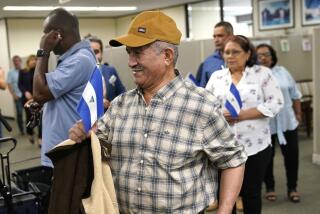Reagan, Shultz Push for Contra Aid
- Share via
WASHINGTON — President Reagan and Secretary of State George P. Shultz, seeking to capitalize on U.S. diplomatic success in the Philippines, called Thursday for support of Nicaraguan rebels who they said are fighting tyrants far worse than deposed President Ferdinand E. Marcos.
Talking to a bipartisan group of congressional leaders summoned to the White House for an upbeat review of this week’s activities in Manila, Reagan said: “I see several parallels to the Philippine situation. We stood for democracy in the Philippines. We have to stand for democracy in Nicaragua and throughout Central America and in our own hemisphere.
“We can ignore the fraudulent elections (Nicaraguan President Daniel) Ortega held,” Reagan said. “We can ignore the repression and we can ignore the subversion, terrorism and drug trafficking. But if we ignore it in Nicaragua and don’t deal with it now, when will we deal with it? I maintain we have to deal with it now.”
A few hours later, Shultz made the same point during an often emotional hearing on Capitol Hill. He said that the final days of the Marcos era in the Philippines were marked by “a government at odds with its own people, . . . a fraudulent election, . . . the Catholic Church, the middle and other segments of society increasingly disaffected.”
“We see many of the same things . . . in Nicaragua except the situation is far worse,” he said.
Point Is Debatable
A White House aide admitted later that the point is debatable.
“You can break the analogy down if you say (Philippine President) Corazon Aquino equals the contras (the Nicaraguan rebels),” said the aide, who declined to be identified by name. “It’s not that kind of analogy.”
Occasionally pounding the table for emphasis, Shultz warned the Senate Foreign Relations Committee that if Congress rejects the Administration’s request for $100 million in aid to the contras, the guerrilla army will collapse.
“If it becomes clear . . . that the United States government will not support people (fighting the Nicaraguan regime), it will be difficult for them to keep going,” Shultz said. “. . . . (The contras) won’t be around any more after you pull the plug on them.”
Some Republicans Skeptical
Members of the committee were lavish in their praise of the Administration’s handling of the crisis in the Philippines, but the panel’s Democrats were unanimously critical of the contra aid plan and even some of the Republicans were skeptical.
Sen. Alan Cranston (D-Calif.) said: “The contras continue to lack popular support--we have seen none of the backing granted elsewhere to the anti-Duvalier or anti-Marcos forces. . . . This Administration seeks to reward failure with a 400% increase (from the current level of $27 million) in taxpayer support.”
Sen. Daniel J. Evans (R-Wash.) complained that he has been “unable to get answers that comfort me” when he has asked what the Administration plans to do if the contras enjoy a little success but later are crushed by the military power of the leftist Sandinista government. He also said that he has been unable to find out the Administration’s contingency plans if the present $100 million plan fails to being down the Sandinistas.
Remark Angers Shultz
Evans drew an angry outburst from Shultz when he pointed to a State Department graph showing steady increases in contra manpower, despite the congressional action halting all military assistance in June, 1984, and commented, “About three more years of no aid and the armed resistance will be larger than the Nicaraguan military.”
“Is that a flip comment?” Shultz demanded. “It’s not a flip subject. It is a very serious subject. There would be more people on this chart if we gave them some support, if they had shoes to wear and uniforms to wear.”
Sen. Christopher J. Dodd (D-Conn.) demanded to know if any Western Hemisphere nation supported the Administration’s plan to supply military aid to the contras.
Neighbors Intimidated
Shultz said that Nicaragua’s neighbors are intimidated by the Managua regime’s Soviet-supplied army. He said that Central American foreign ministers have told him privately that they back the U.S. policy, although “it is very difficult for countries publicly to take a position.”
“In other words, they are saying one thing publicly and another privately,” Dodd said.
“Some are,” Shultz replied.
More to Read
Sign up for Essential California
The most important California stories and recommendations in your inbox every morning.
You may occasionally receive promotional content from the Los Angeles Times.












